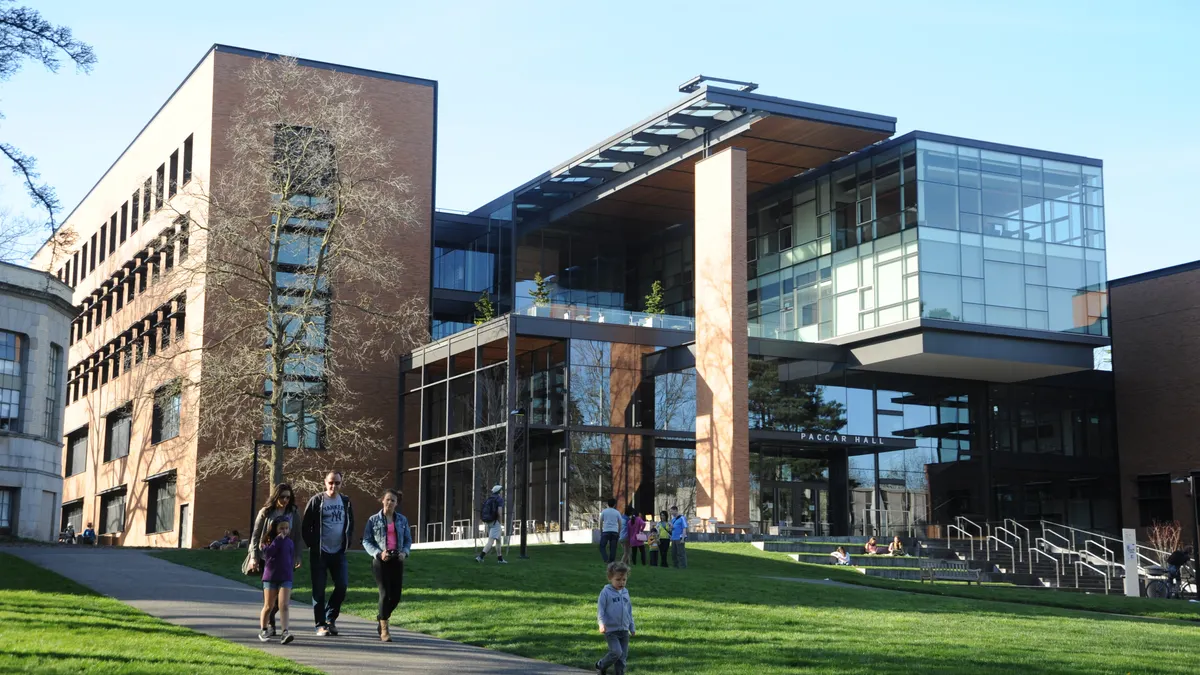For even the most confident new college student, moving to campus requires some adjustment. They’ll be living away from their families – perhaps for the first time – not to mention the challenge of moving in and getting along with someone they’ve never met before. Being able to experience some of the comforts of home on campus goes a long way to ease the transition.
This semester, college students are dealing with a new kind of adjustment – from on-campus classes to socially distant digital learning. Meanwhile, colleges are finding creative ways to stay connected with students while they’re back at home and to ensure they’ll feel welcome and safe when they return to campus.
The importance to students of a welcoming campus environment has been documented in research like that of Elizabeth Scott-Francis, a Vanderbilt University doctoral student who has examined the various influences on college students’ ability to persist.
“So many students that I've interviewed or spoken with say that feeling at home was one thing that could truly make or break their experience in college and, ultimately, influences their ability to stay enrolled,” says Scott-Francis, who has been the Assistant Director of Resident Life at the Juilliard School since August 2019, following three years at Vanderbilt as a program coordinator for the Residential Colleges. “Feeling at home means a lot of different things to different people. For some students, that means having really close interpersonal connections with their faculty members. For others, it means being able to find their favorite vegan snacks in the dining hall.”
College administrators like Scott-Francis who are involved in shaping the campus life experience understand how crucial it is to student retention and success. From accommodating student preferences in residential hall amenities and dining fare to helping them stay connected to their families, schools are finding creative ways to turn nervous newcomers into confident members of the academic community that is their home away from home.
Residential Life
Some of the latest trends in student housing highlight efforts to address the demands of today’s college students for living spaces that are both tech and environmentally friendly. As noted in a report from the National Apartment Association, reliable high-speed internet connectivity is now the standard expectation. A dormitory space without enough wireless access points or outlets for plugging in and recharging their myriad devices would be no more acceptable to a college recruit than one without indoor plumbing. But if tech access on demand is the norm, so is green living, the report says. Students arrive on campus expecting the same kinds of recycling, water conservation and sustainability-conscious shopping that was available in their neighborhoods and schools.
College administrators and housing designers are taking note and making changes to create the kinds of spaces that these nature-loving, digital natives want to live in.
Dining Experience
Colleges and universities are also stepping up their game when it comes to the variety and convenience of the dining experiences they offer. While campus dining fare may never measure up to the average student’s memories of home-cooked meals, a growing number of campus dining services are catering to their customers’ personal and cultural preferences. As FoodService Director magazine reports, these dining trends include shareable food styles like mezzes and tapas, meals that students can customize, and a wider selection of vegetarian and allergen-free dishes. Dining halls are expanding their menus of international cuisine, not only to give international students a taste of home but also to please the adventurous palates of their American students.
Many schools are breaking out of the fixed dining hours tradition by offering food delivery, mobile ordering apps and convenient places for students to grab a late-night snack when dining halls are closed.
Family Connections
A big part of a college student’s adjustment to campus life is learning to navigate the journey of self-discovery and self-reliance that begins when they say goodbye to their parents at the end of move-in day. Campus administrators may design their parent and family programs to include guidance for parents who want to give their college kids an approving nudge toward independence.
“Many students are close with their families, so having family members encourage their students to get involved or advocate for themselves can make all the difference in the world in a student's confidence and their ability to adjust to college life,” Scott-Francis says. “It's important for family members, or really anyone who cares for or supports a college student, to encourage their students to get involved and build roots on campus.”
Of course, putting down roots in their new college community doesn’t mean cutting ties with the folks at home. While most students don’t want their parents to hover, being able to stay in touch with calls, texts and video chats is comforting. And they never get too grown to appreciate an occasional care package to let them know someone back home is thinking of them.
With their often overwhelmed mail centers, it can be a challenge for colleges to ensure those packages get to their recipients on time. Sometimes students are too busy to get to the mail center during regular business hours because they have classes, jobs or other activities during the day, says Stephanie Benedetto, Director, Product Marketing, SaaS Shipping and Receiving Solutions at Pitney Bowes. When they do have a chance to use a break in their schedule to pick up a package, they may have to stand in line for a half hour or more.
Pitney Bowes recently introduced a package delivery system called Intelligent Lockers that makes it much easier for students to get their hands on these boxes of goodies from home. The secure, self-service, on-demand system lets users retrieve packages with the scan of a barcode.
“The benefit the locker provides is that it gives them 24-hour access,” Benedetto says. “They can pick it up whenever it’s convenient.”
Whether it’s speeding up the delivery of family-sent packages, rethinking residential spaces or providing more dining options, every effort to create a campus environment that feels like home encourages students to stick around and complete their degrees.
To learn more about Intelligent Locker systems, visit Pitney Bowes and download The New Parcel Management eBook: Higher Ed Edition.






